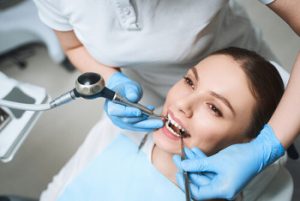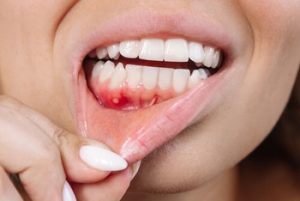The sensation of a chipped tooth varies based on its severity and location. Whether it’s a small chip or a significant break that exposes the tooth’s nerve, a chipped or cracked tooth may lead to discomfort, sensitivity, or even pain. Understanding what a chipped tooth feels like, why it happens, and how to get it treated will help you maintain your oral health and prevent further damage.
That Strange Feeling: What Does a Chipped Tooth Feel Like?
You may have chipped or cracked a tooth if you’ve ever run your tongue across your teeth and suddenly felt a rough or jagged edge. A chipped tooth can feel sharp, uncomfortable, or even painful, especially when eating or drinking. Here are some of the most common sensations associated with a broken or chipped tooth:
- Jagged Edges: A chipped tooth often has an uneven or rough surface, which you may notice with your tongue.
- Tooth Sensitivity: Exposed tooth enamel can make the affected tooth sensitive to hot or cold foods and drinks.
- Pain When Chewing: If the tooth crack extends deeper into the tooth pulp, you might feel discomfort or pain while eating hard foods.
- Gum Irritation: A chipped tooth at the gum line can irritate the surrounding tissues, making them feel sore or inflamed.
- No Pain At All: Some minor chips may not cause any immediate pain, but they can still weaken the tooth’s surface over time.
How Do Chipped or Cracked Teeth Happen?
A chipped or cracked tooth can occur for various reasons, ranging from everyday habits to unexpected trauma. While some causes are preventable, others may happen suddenly. Recognising the typical causes of a chipped or broken tooth allows you to take proactive measures to safeguard your oral health and minimise the risk of further harm.
1. Biting Down on Hard Foods
Chewing on hard foods like ice cubes, nuts, popcorn kernels, or hard candy can put excessive pressure on your teeth, leading to tooth cracks or chips. Even biting into something unexpectedly hard—like an unpopped popcorn kernel—can cause a chipped or broken tooth.
2. Teeth Grinding (Bruxism)
Chronic teeth grinding, or bruxism, puts excessive stress on your tooth enamel, weakening your teeth over time. This can result in small hairline cracks or a full split tooth. People who grind their teeth often aren’t aware they’re doing it, as it commonly happens during sleep. Wearing a protective mouth guard at night can help prevent chipped or cracked teeth.
3. Trauma or Injury
A common dental injury is caused by direct trauma to the mouth. This can happen due to:
- A fall that impacts the front tooth or other teeth.
- An injury sustained during sports, particularly in high-contact activities such as football, basketball, or boxing.
- An accident, such as getting hit in the mouth with an object or during a car crash.
Wearing a mouth guard while playing sports can help reduce the likelihood of requiring treatment for a broken tooth.
4. Weak or Weakened Teeth
Certain conditions or previous dental work can make teeth more prone to chipping, cracking, or breaking. These include:
- Large dental fillings: Large fillings can weaken the remaining tooth structure, making it more likely to crack.
- Root canal treatment: A tooth that has received root canal treatment is often more brittle and prone to fracturing.
- Tooth decay: When cavities or tooth decay weaken a tooth, it becomes more likely to chip.
- Acidic foods: Frequent intake of acidic foods and drinks can erode tooth enamel, making teeth more prone to damage.
5. Sudden Temperature Changes
Exposing your teeth to extreme temperature changes—such as drinking an ice-cold beverage right after sipping hot soup—can cause tooth cracks. This happens because the tooth expands and contracts rapidly, leading to stress fractures in the enamel.
6. Using Teeth as Tools
Putting excessive pressure on your teeth by using them to open packages, tear tape, or bite fingernails can lead to damage. This habit can cause small fractures that worsen over time, eventually leading to a cracked tooth.
7. Age-Related Wear and Tear
Over time, teeth naturally undergo wear and tear due to years of chewing, grinding, and exposure to various foods. This can cause minor hairline cracks that may not be noticeable at first but can weaken teeth over time.
8. Untreated Dental Problems
Ignoring minor dental issues, such as small cavities or early signs of tooth cracks, can lead to more significant problems down the road. A chipped tooth untreated can develop into a larger cracked or broken tooth, requiring more extensive treatment like a dental crown or even tooth extraction.
Chipped Tooth vs Cracked Tooth: What’s the Difference?

How can you tell the difference?
- A chipped tooth is often visible and may feel rough but doesn’t always cause pain.
- A cracked tooth may not be visible but can cause sharp pain when biting down.
Ignoring a Chipped Tooth? Here’s Why That’s a Bad Idea
A chipped tooth may appear insignificant, especially if it isn’t causing pain or noticeable damage. However, neglecting a chipped or cracked tooth can result in various dental issues that may significantly affect your oral health. Even a minor chip can deteriorate over time, leading to discomfort, infections, and, in severe cases, the need for tooth extraction.
1. The Chip Can Worsen Over Time
A chipped tooth untreated can continue to wear down due to normal biting and chewing. Everyday actions, such as eating or teeth grinding, can cause the chip to grow larger, leading to a cracked tooth or even a split tooth.
What can happen?
- A small chip may turn into a large fracture.
- The tooth’s surface becomes weaker, increasing the risk of further damage.
- If the tooth crack reaches the tooth pulp, a root canal treatment may be needed.
2. Increased Tooth Sensitivity
Enamel serves as a protective barrier, guarding the inner tissues of the tooth from temperature fluctuations and irritation. When part of it is chipped away, the tooth’s nerve becomes more exposed. This leads to tooth sensitivity, especially when consuming hot or cold foods.
Signs of increasing sensitivity:
- A sharp or tingling sensation when eating ice cream or drinking hot coffee.
- Discomfort when biting into acidic foods like citrus fruits.
- A dull ache that lingers after eating certain foods.
3. Higher Risk of Tooth Decay and Infection
A chipped or broken tooth creates an entry point for bacteria, increasing the risk of tooth decay. If not addressed, the decay can reach the tooth pulp, potentially causing an infection or, in severe cases, a tooth abscess.
Warning signs of infection:
- The tooth hurts continuously, even without chewing.
- Inflammation or redness in the gums surrounding the affected tooth.
- A bad taste or pus is coming from the damaged tooth.
At this stage, root canal treatment or even tooth extraction may be required to limit the infection from spreading to surrounding teeth or the blood vessels in your gums.
4. Changes in Your Bite and Jaw Pain
A chipped or cracked tooth can affect how your teeth fit together when you bite down. This misalignment can lead to:
- Jaw pain from overcompensating for the damaged tooth.
- Increased wear on other teeth leads to further dental problems.
- Development of cracked tooth syndrome, where cracks spread deeper over time.
Ignoring a broken tooth, depending on its severity, could lead to TMJ disorders, causing chronic jaw pain and discomfort.
5. Gum Irritation and Soft Tissue Damage
A chipped front tooth or a cracked tooth with jagged edges can irritate the tongue, gums, or inner cheeks. Over time, this can cause:
- Painful sores from constant rubbing.
- Inflammation of the surrounding soft tissue.
- Difficulty speaking or eating due to discomfort.
Covering the jagged edges with dental wax or sugar-free gum can offer temporary relief, but the best solution is to see a dentist immediately.
6. Weakened Teeth and Breakage
A chipped or broken tooth is structurally compromised, making it more susceptible to further damage. Everyday activities like chewing hard foods, clenching your jaw, or playing contact sports without a mouth guard can cause the entire tooth to break.
Risk factors that increase breakage:
- Large dental fillings weaken the tooth structure.
- Previous root canal treatment made the tooth more brittle.
- Cracked tooth syndrome, where small hairline cracks worsen with time.
If the tooth fragment becomes too large, broken tooth repair might require a dental crown, root canal treatment, or even tooth extraction.
7. Potential for Tooth Loss
If a chipped tooth is left untreated for too long, the damage can reach the tooth’s nerve and root, leading to a vertical root fracture. At this point, saving the tooth becomes difficult, and tooth extraction may be necessary.
What happens next?
- A missing tooth can cause neighbouring teeth to shift, disrupting your bite alignment.
- Bone loss in the jaw can occur if the missing tooth is not replaced.
- To restore proper function and maintain oral health, a dental implant, bridge, or a denture may be required.
What Should You Do If You Chip a Tooth?
If you suspect you have a broken or chipped tooth, here’s what you can do before seeing a dentist:
- Rinse Your Mouth: Use warm water to cleanse the area and eliminate any debris.
- Apply Dental Wax or Sugar-Free Gum: Use dental wax or sugar-free gum to cover jagged edges and protect your mouth from irritation.
- Use a Temporary Dental Filling Material: Some pharmacies sell temporary dental filling material to protect the damaged tooth.
- Eat Soft Foods: Avoid biting on hard foods that could worsen the chip.
- Avoid Acidic Foods: Acidic foods can further weaken the enamel and cause discomfort.
- Take Pain Relievers: Over-the-counter pain relief can help manage discomfort until you see a dentist.
How Is a Chipped or Broken Tooth Repaired?
Dentists offer several common cracked tooth treatments, depending on the severity of the break.
1. Dental Bonding
Dental bonding can restore the tooth using a tooth-coloured resin for minor chips. This is a quick and affordable solution, often completed in one visit.
2. Dental Fillings
If the chip affects a back tooth, dental fillings may be used to restore the shape and function of the tooth.
3. Dental Crowns
A dental crown may be needed for larger chips or cracked tooth repairs. Crowns cover the damaged tooth and provide protection against further damage.
4. Root Canal Treatment
If the tooth crack reaches the tooth pulp, a root canal treatment may be required to remove the infected tissue before sealing the tooth.
5. Tooth Extraction
In severe cases where the tooth is beyond repair, extraction may be mandatory, with a dental implant or bridge as a replacement option.
How Can You Prevent a Chipped or Cracked Tooth?
Protecting your teeth from damage is key to maintaining long-term oral health. Here are some ways to prevent chipped or broken teeth:
- Wear a Protective Mouth Guard: If you engage in contact sports, a mouth guard can protect against common dental injuries.
- Avoid Hard Foods: Cut down on hard candy and ice chewing to prevent unnecessary stress on your teeth.
- Use a Night Guard for Teeth Grinding: If you experience bruxism, using a mouth guard can help minimise excessive wear and lower the risk of developing cracked tooth syndrome.
- Maintain Good Dental Care: Regular dental check-ups and proper oral hygiene help keep your teeth strong.
When to See a Dentist Immediately

- The chip is large or painful.
- You have tooth sensitivity that doesn’t go away.
- The tooth hurts when biting down.
- You may observe signs of infection, such as swelling or the presence of pus.
Neglecting a damaged tooth can result in more serious dental issues over time. Seeking professional treatment helps preserve your natural tooth and reduces the likelihood of requiring more invasive procedures.
Final Thoughts: Don’t Let a Chipped Tooth Become a Bigger Problem
A chipped or broken tooth is not just a cosmetic concern—it can impact your oral health and lead to serious complications if ignored. Whether it’s a chipped front tooth, a cracked tooth, or a more severe break, seeking timely dental care is essential to preserving your smile and preventing further damage.
If you suspect you chipped or cracked a tooth, don’t wait. Schedule a consultation today at (08) 7078 8263 as soon as possible to prevent further damage and restore your natural tooth to its former strength.
Note: Any surgical or invasive procedure carries risks. Before proceeding, you should seek a second opinion from an appropriately qualified health practitioner.
References
- Cleveland Clinic. (n.d.). Chipped tooth. Retrieved from https://my.clevelandclinic.org/health/diseases/chipped-tooth
- WebMD. (n.d.). Teeth grinding (bruxism). Retrieved from https://www.webmd.com/oral-health/teeth-grinding-bruxism
- Mayo Clinic. (n.d.). Cavities: Symptoms & causes. Retrieved from https://www.mayoclinic.org/diseases-conditions/cavities/symptoms-causes/syc-20352892
- Colgate. (n.d.). What is good oral hygiene? Retrieved from https://www.colgate.com/en-us/oral-health/adult-oral-care/what-is-good-oral-hygiene#
- Healthline. (n.d.). Tooth extraction. Retrieved from https://www.healthline.com/health/tooth-extraction


